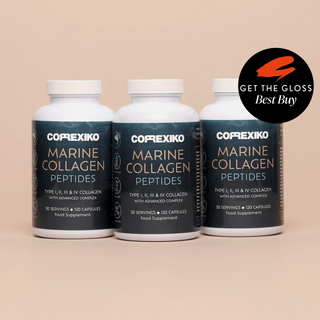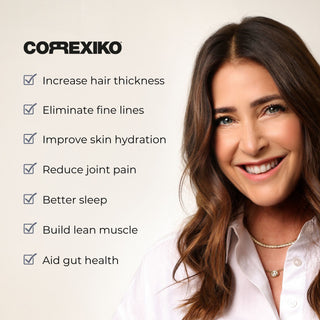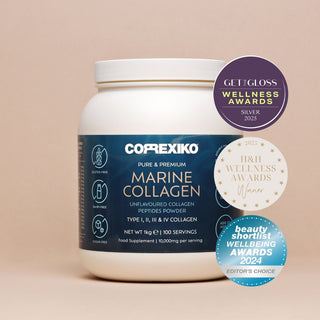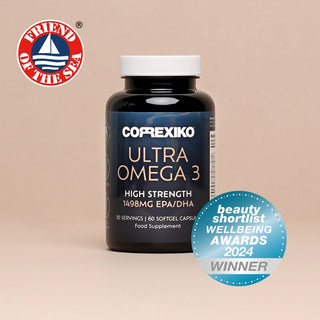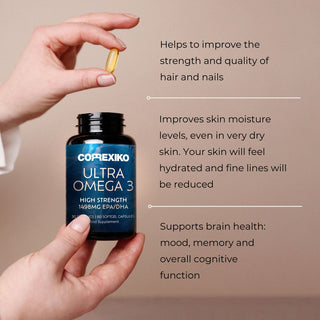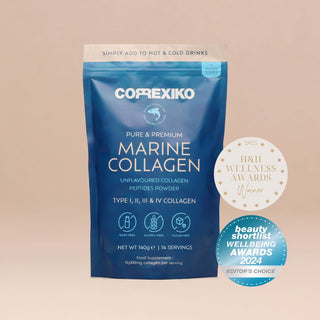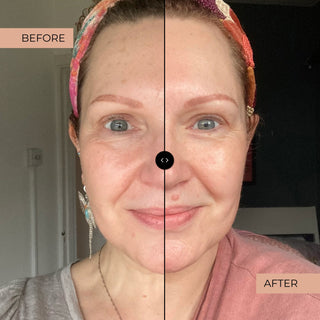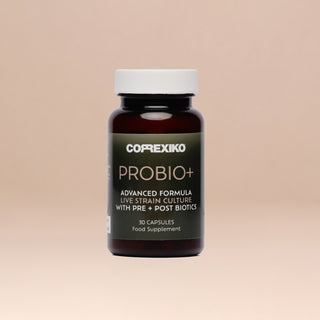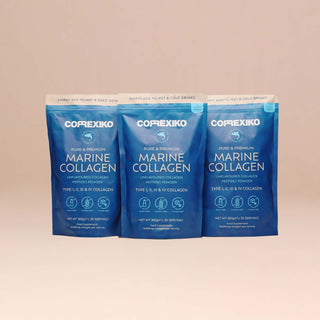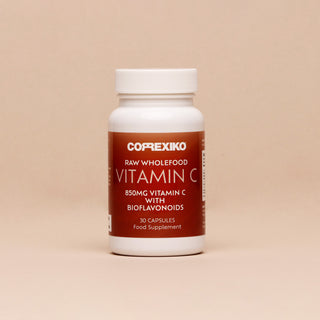Collagen is a type of protein that's found in many different parts of your body. This article answers one of our readers who send us an email with the question "should I take collagen every day" so we took the challenge and wrote a post about it.
First, Let's Explain How Your Body Behaves & What It Needs
Collagen is a type of protein that helps keep your joints and skin elastic. It's in your blood, muscles, and bones, comprising three-quarters of the protein in your skin and the third part of your body.
As you get older, your body produces less collagen, and it becomes harder for your body to create new collagen. Because of this, many people turn to use collagen supplements. Collagen powder is the most common form that people prefer, but collagen supplements are also available in capsules. See here and here respectively.
In order to produce collagen, your body needs a series of other ingredients, called amino acids. When combined they produce collagen.
Some foods, including bone broth (which contains collagen), beef, fish, chicken (which contains gelatin), dairy, and eggs (which contain casein) either contain collagen or help the body produce it on its' own by providing essential amino acid and other nutrients needed to produce it.
Because your body is able to produce all of the collagen you require if you eat a balanced and nutritious diet, supplements may not always be necessary for everyone. However, you may choose to use it for certain health benefits or help with collagen deficiency or other conditions if you wish.
Types of collagen
Did you know there are 28 known types of collagen, each serving a specific purpose within our bodies?
Type I collagen makes up approximately 90% of connective tissue in humans and is responsible for maintaining the structural integrity of tissues like bone, tendon, ligament and muscle.
Type II collagen forms long fibres called fibrils and helps maintain joint flexibility.
Type III collagen is one of the main components of basement membranes, which separate cells and provide support for internal structures.
Type IV collagen forms a scaffold around neurons, allowing nerve impulses to travel along certain pathways. T
Type V collagen is found in blood vessels and is involved in wound healing.
Hydrolyzed collagen
Hydrolyzed collagen is one among many different types of collagen supplement products.
Collagen supplements are typically derived from animal sources, such as bovine gelatin, chicken feathers, fish scales, and pig intestines. Some manufacturers use plant-based materials like soybean, wheat gluten, pea, potato, rice, and krill proteins, as well as algae extracts.
At CORREXIKO, we only use the skin of deep sea, unfarmed fish harvested from the pristine Canadian waters - for two unique reasons:
1. Because of the crystal clear waters of Canada
2. Because fish skin contains more collagen concentration, however, it is more difficult to process than the cheaper alternative that most mainstream brands use - fish scales.
In general, people take collagen supplements because it promotes building stronger connective tissue, reduces inflammation, boosts energy levels, and increases overall health.
There are no known side effects associated with taking collagen supplements. However, some consumers report experiencing gastrointestinal discomfort, constipation and bloating, but very rarely, and this is because their body is incapable of processing the added protein they consume.
Should you take collagen every day?
The American College of Lifestyle Medicine (ACLM), a nonprofit organization focused on promoting healthy lifestyles, says there are no official recommendations for what amounts of collagen people should consume daily.
As a subscriber to this blog, you already know that there are three forms of collagen:
- animal-based,
- plant-based,
- and synthetic.
Animal-based collagens come from animals like cows, pigs, sheep, goats, horses, and chickens; while plant-based collagens are derived from plants such as soybeans, corn, wheat, alfalfa, and rice, oats, barley, beans, peas, lentils, and algae. Synthetic collagens are manmade and primarily used to treat wounds.
So, how do you figure out how much collagen you need?
First, decide whether you want to supplement with animal-based or plant-based collagens. It is noteworthy that animal-based collagen such as Marine Collagen or Collagen Peptides contain larger amounts of collagen and are more effective.
Then, consider which type you'd prefer. Would it be in powder form or in capsules?
Some people simply want their collagen mixed with their coffee or tea, their cereals or their smoothies - and you can't blame them because most premium brand collagens like CORREXIKO have no taste or smell.
Others simply want a capsule - and others prefer a combination of both (which is something we always recommend to boost your results - i.e. a spoonful of collagen in the morning with your coffee, tea, cereal or smoothie and two capsules before you go to bed a t night).
But, according to the ACLM, you shouldn't just buy whatever is cheapest. Instead, make sure you purchase supplements that contain the highest quality collagen possible, for example, CORREXIKO.
What is the proper dosage?
There isn't a "proper" dosage. It all depends on your needs, and the best person to tell you how much your need is your doctor. You can also experiment yourself, but starting slowly and increasing the dosage - unless you have an intolerance to protein, collagen is simply that - a protein - and has no side effects for the majority of people.
If you want a guide on the dosage, a 2019 review of clinical studies found that taking 2.5–15 grams of hydrolyzed collagen peptides each day may be safe and effective.
What happens when you take collagen every day?
1. Your muscle mass will increase.
A recent study published in the Journal of Applied Physiology found that consuming collagen peptides during weightlifting sessions produced greater gains in lean tissue mass and increased strength compared to resistance training without the addition of collagen peptides.
Researchers recruited 20 healthy males ages 18–35 to participate in either resistance training or combined resistance training and collagen peptide supplementation. Both groups completed eight weeks of training and consumed daily doses of 2 grams of collagen peptides.
After 8 weeks, participants in the combined group had gained 4.2 pounds of lean tissue mass, while those in the resistance training only group gained just 0.6 pounds. Additionally, the combined group experienced an increase in muscular strength of 12% compared to 7% for the resistance training only group.
The authors concluded that combining resistance training with collagen peptide supplementation may prove beneficial in increasing lean tissue mass and improving muscular strength. They suggest that future studies include larger sample sizes and longer-duration trials.
2. Your skin texture will see a great improvement
Collagen supplements are often touted as a way to improve skin health and reduce wrinkles. A recent study found that taking a supplement containing 2.25–5 grams of collagen per day over eight weeks helped improve skin hydration, elastic properties, and skin smoothness among women ages 40–60.
Another study showed similar benefits for women ages 50–70.
The researchers believe that the combination of vitamin C, zinc, and biotin along with a vitamin E complex helps the body absorb collagen better. By improving skin hydration, you can prevent wrinkles and fine lines.
Collagen also supports healthy connective tissue, including ligaments, tendons, cartilage, and bone.
3. You will see less bone loss
As you age you will experience faster bone loss than before, and losing too many bone minerals puts you at greater risk of suffering from bone fractures or osteoporosis.
Collagen supplements are known to increase bone mineral density, making it possible to protect against bone loss. A recent study found that taking a collagen supplement could prevent bone loss in postmenopausal women.
Postmenopausal women were given either a collagen supplement or a placebo daily for 12 months. At the end of the study period, those who had taken the supplement showed significant improvement in bone mineral density, while there was no change in the placebo group.
This suggests that collagen supplementation may be able to promote bone health and reduce the risk of fractures.
4. Your heart health will see an improvement
Heart disease is the number one killer in the United States, causing about 610,000 deaths each year.
Heart disease is responsible for nearly half of all deaths in the U.S., according to the Centers for Disease Control and Prevention.
And although there are some lifestyle changes you can make to reduce your risk of heart disease, there are few proven methods to prevent it altogether.
However, recent studies suggest that taking collagen supplements could help protect against cardiovascular issues like coronary artery disease, stroke, peripheral arterial disease, and hypertension.
In one small study that looked into the effects of collagen supplementation on the development of atherosclerotic plaque, researchers found that healthy individuals who supplemented with 16 grams of collagen daily over six months experienced a significant decrease in measures of artery stiffness and an increase in HDL levels.
The authors conclude that collagen supplementation could contribute to the prevention and/or treatment of atherosclerosis, a narrowing of arteries caused by inflammation and the buildup of fatty substances called plaques.
5. Your nails will become stronger
Nail health isn't just about keeping your cuticles clean. Collagen peptides are a type of protein found in food that helps keep our nails strong and healthy.
A recent study published in JAMA Dermatology showed that people who take collagen supplements daily experience stronger nails, compared to those who don't. This small study involved 64 adults ages 18 to 60 who had been diagnosed with brittle hair or nails.
They were randomly assigned to receive either 2.5 grams of a supplement containing collagen peptides or a placebo every day for 24 weeks. Participants' fingernails grew faster and broke less often in the group receiving collagen peptides, compared to the control group.
The researchers theorize that collagen peptides work because they stimulate cell growth and repair damaged tissue. Another theory suggests that it could be due to the presence of glutamine, an amino acid that plays a role in building muscle mass. Because of this, it might encourage the body to produce more collagen, which is needed to build strong nails.
6. Your hair will grow faster and become stronger
A recent study found that taking collagen supplements along with Vitamin C helped increase hair growth in women with hair loss.
Researchers tested the effects of collagen supplementation on hair growth in 20 female subjects aged 18–45 over a period of 90 days. They found that daily intake of collagen after 60 days resulted in increased hair length in women with temporary hair loss.
The researchers concluded that "daily intake of collagen after 90 d showed significant improvement in hair density, thickness, and quality."
7. You will be relieved of joint pain
Osteoarthritis affects millions of Americans every day. While it often starts slowly, over time, painful symptoms can progress to include joint stiffness and swelling.
But there are ways to help manage the discomfort. One common treatment involves taking supplements containing glucosamine and chondroitin, both naturally occurring substances found in animal products such as fish and shellfish.
A study published earlier this month in JAMA Internal Medicine looked at whether eating foods rich in collagen could provide similar benefits. Researchers analyzed data from three separate clinical trials involving nearly 300 participants.
They found that those who consumed high amounts of dietary collagen had lower levels of joint pain and improved physical functioning compared to those who did not consume enough.
Conclusion
There is no specific amount of collagen to consume each day. There are benefits when you take your collagen every day ranging from improved skin texture to heart and joint relief.
Always be mindful of the brands you select and as an educated consumer you must ask questions and educate yourself on the matter- after all, it is your health.


